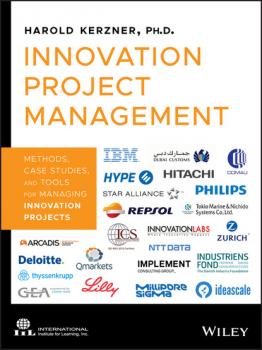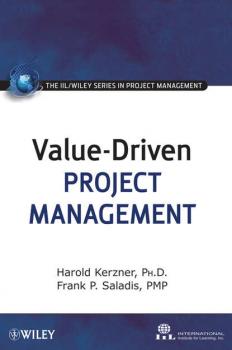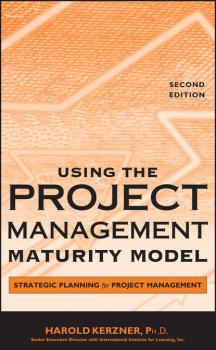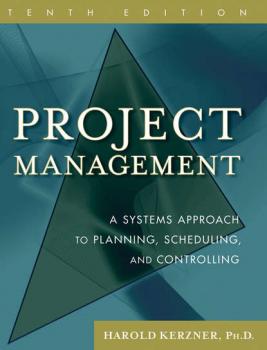Harold Kerzner, Ph.D.
Список книг автора Harold Kerzner, Ph.D.Value-Driven Project Management
In the traditional view of project management, if a project manager completed a project and had adhered to the triple constraints of time, cost, and performance, the project was considered a success. Today, in the eyes of the customer and the parent or sponsoring company, if a completed project did not deliver its anticipated value, it would be seen as a failure. Today's changing economic climate, marked by an increasingly competitive global environment, is driving project managers to become more business oriented. Projects must now be viewed from a strategic perspective within the context of a business or enterprise that needs to provide value to both the customer and the organization itself. As a result, project managers are now required to possess the skills to complete a project within certain specifications, and also know how to create and deliver value. Responding to the needs of today's project managers, Value-Driven Project Management begins by changing the paradigm of project management. Rather than judge the success of a project from the perspectives of time, budget, and quality, the authors demonstrate why success is only achieved when planned business values are met, including: Internal value Financial value Future value Customer-related value The authors also offer best practices that allow you and your organization to create additional value in efficiency, customer satisfaction, and enhanced products and services. Finally, the book helps you incorporate value into clearly defined business objectives and «sell» the value-driven process to executives. Throughout the book, helpful illustrations clarify complex concepts and processes. Assigning valuable resources to projects that don't provide some tangible form of value to the organization and to the client is poor management and poor decision-making. On the other hand, selecting and implementing projects that will deliver value and an acceptable return on investment is effective management and decision-making, but is very challenging, especially when a project may not provide its target value for years to come. With Value-Driven Project Management in hand, you'll discover the tools you need to ensure that projects deliver true value upon their completion.
Using the Project Management Maturity Model
Updated for today's businesses-a proven model FOR assessment and ongoing improvement Using the Project Management Maturity Model, Second Edition is the updated edition of Harold Kerzner's renowned book covering his Project Management Maturity Model (PMMM). In this hands-on book, Kerzner offers a unique, industry-validated tool for helping companies of all sizes assess and improve their progress in integrating project management into every part of their organizations. Conveniently organized into two sections, this Second Edition begins with an examination of strategic planning principles and the ways they relate to project management. In the second section, PMMM is introduced with in-depth coverage of the five different levels of development for achieving maturity. Easily adaptable benchmarking instruments for measuring an organization's progress along the maturity curve make this a practical guide for any type of company. Complete with an associated Web site packed with both teaching and learning tools, Using the Project Management Maturity Model, Second Edition helps managers, engineers, project team members, business consultants, and others build a powerful foundation for company improvement and excellence.
Project Management Best Practices: Achieving Global Excellence
The comprehensive guide to project management implementation, updated with the latest in the field Project management has spread beyond the IT world to become a critical part of business in every sphere; built on efficiency, analysis, and codified practice, professional project management leads to the sort of reproducible results and reliable processes that make a business successful. Project Management Best Practices provides implementation guidance for every phase of a project, based on the real-world methodologies from leading companies around the globe. Updated to align with the industry’s latest best practices, this new Fourth Edition includes new discussion on Agile and Scrum, tradeoffs and constraints, Portfolio PMO tools, and much more. Get up-to-date information on the latest best practices that add value at every level of an organization Gain insight from more than 50 project managers at world-class organizations including Airbus, Heineken, RTA, IBM, Hewlett-Packard, Sony, Cisco, Nokia, and more Delve deeper into implementation guidance for Agile, Scrum, and Six Sigma Explore more efficient methodologies, training, measurement, and metrics that boost organization-wide performance Adopt new approaches to culture and behavioral excellence, including conflict resolution, situational leadership, proactive management, staffing, and more Ideal for both college and corporate training, this book is accompanied by an Instructor’s Manual and PowerPoint lecture slides that bring project management concepts right into the classroom. As the field continues to grow and evolve, it becomes increasingly important to stay current with new and established practices; this book provides comprehensive guidance on every aspect of project management, with invaluable real-world insight from leaders in the field.
Project Management
The landmark project management reference, now in a new edition Now in a Tenth Edition, this industry-leading project management «bible» aligns its streamlined approach to the latest release of the Project Management Institute's Project Management Body of Knowledge (PMI®'s PMBOK® Guide), the new mandatory source of training for the Project Management Professional (PMP®) Certificat-ion Exam. This outstanding edition gives students and professionals a profound understanding of project management with insights from one of the best-known and respected authorities on the subject. From the intricate framework of organizational behavior and structure that can determine project success to the planning, scheduling, and controlling processes vital to effective project management, the new edition thoroughly covers every key component of the subject. This Tenth Edition features: New sections on scope changes, exiting a project, collective belief, and managing virtual teams More than twenty-five case studies, including a new case on the Iridium Project covering all aspects of project management 400 discussion questions More than 125 multiple-choice questions (PMI, PMBOK, PMP, and Project Management Professional are registered marks of the Project Management Institute, Inc.)
What Executives Need to Know About Project Management
As project management has evolved and matured, so has the executive's role in project management. To ensure the success of individual projects and the organization as a whole, today's executives are increasingly involved in activities such as capacity planning, portfolio management, prioritization, and strategic planning specifically for project management. In fact, more and more executives are becoming certified Project Management Professionals (PMPs). What Executives Need to Know About Project Management offers executives a guide to project management, focusing on what they need to know and what they need to do. It provides step-by-step guidance to help executives get effective, well-resourced project management teams in place and ensure the success of any individual project. The book begins with basic principles, including a detailed discussion of the three best practices that enable executives to ensure effective project management: Developing an environment where project management is viewed as a profession Securing key personnel for project management positions Creating opportunities for rewards and advancement through successful project management Next, the book explores how executives serve as executive sponsors in project management teams, setting forth solutions to the many problems and challenges they face in this role, including managing disagreements, delegating authority, and accelerating projects. The authors explain how the role of the executive sponsor changes depending upon the life-cycle phase of the project. For example, during the project initiation and planning phases, the sponsor may take on a very active role, ensuring that proper objectives are established and that the project plan satisfies the needs of the business as well as the needs of the client. During the execution phase, the sponsor may take on a less active role; however, the book shows how executive sponsors need to become involved when roadblocks appear, crises occur, and conflicts arise over priorities among projects. Throughout the book, helpful illustrations clarify complex concepts and processes.








